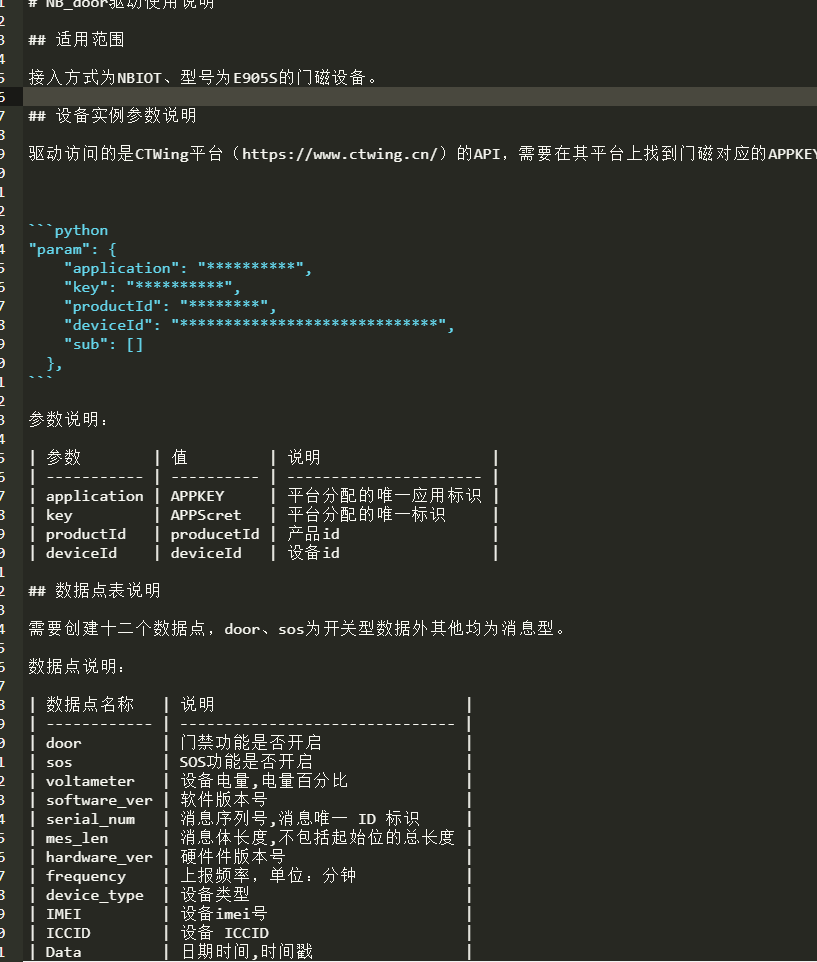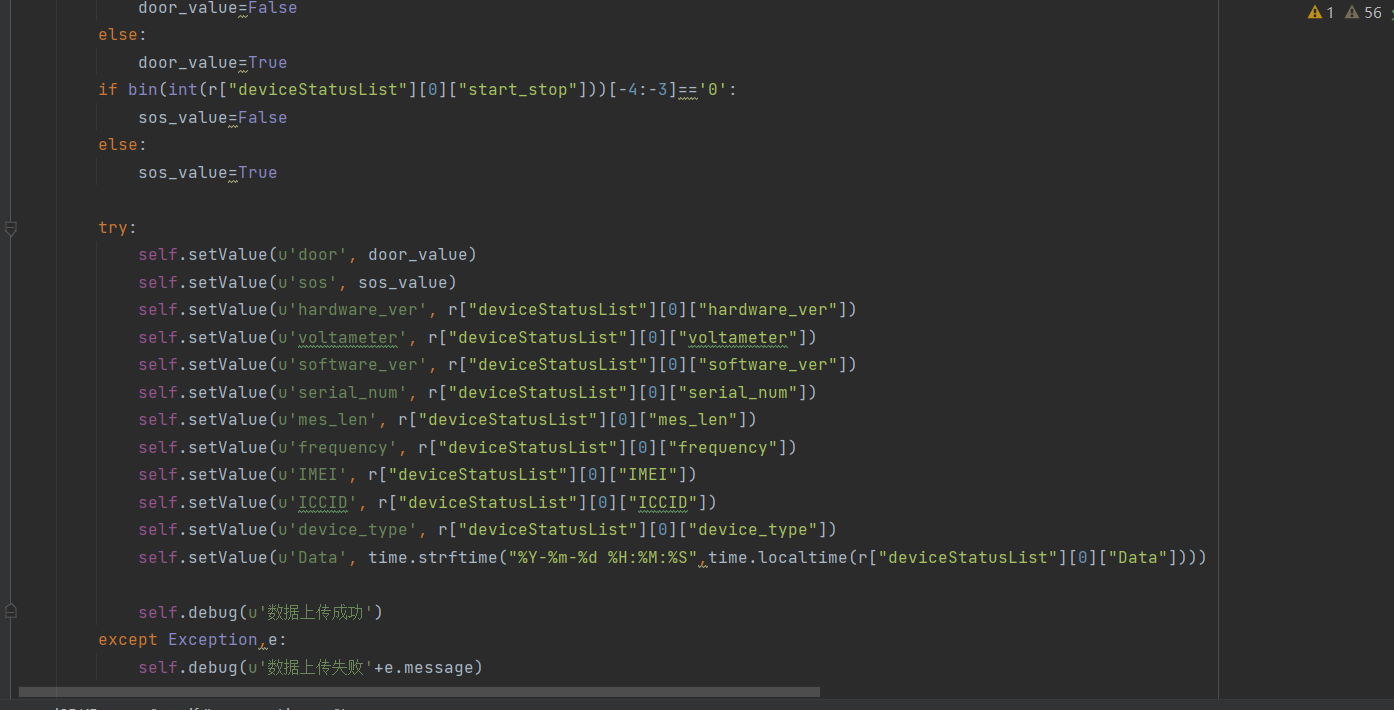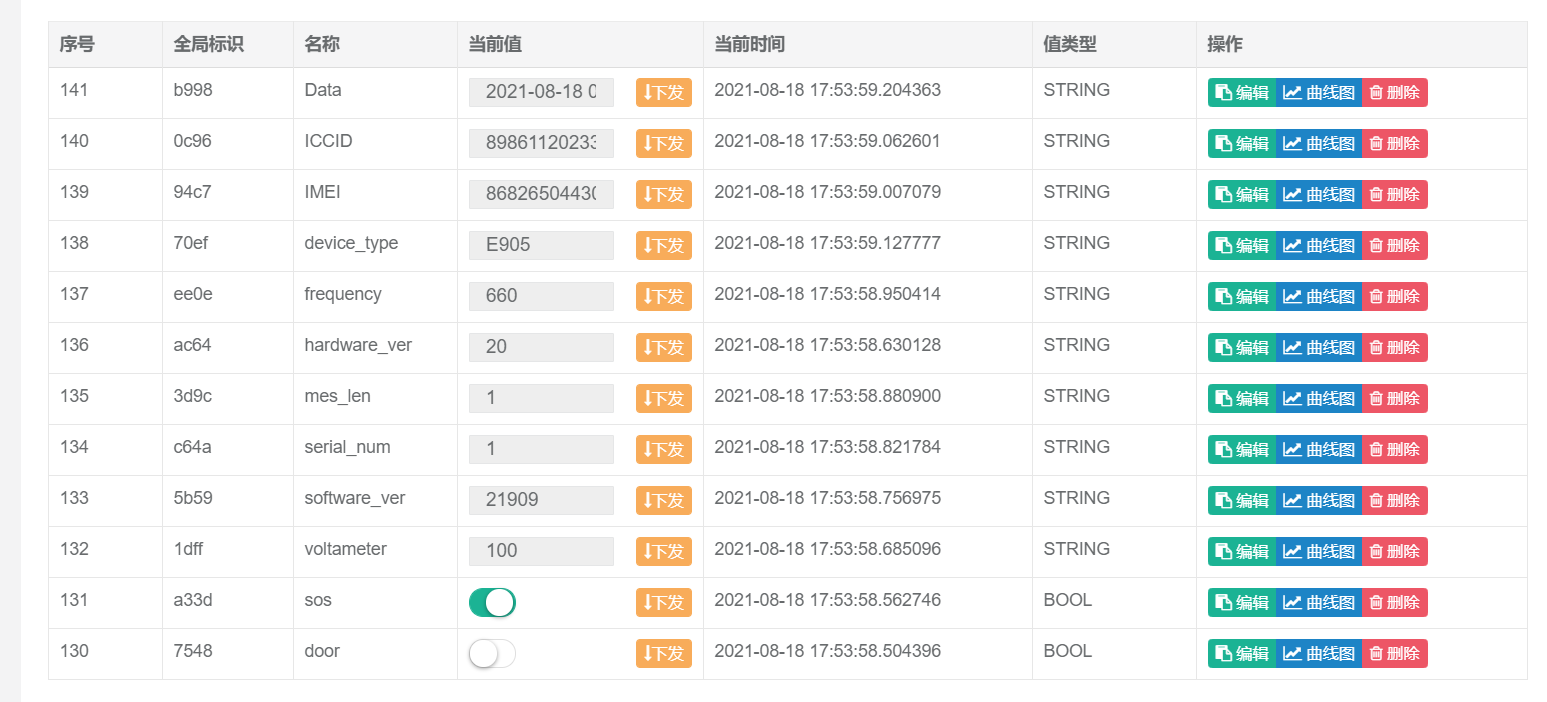本文章为原创,转载请注明出处!
登录平台:IOTOS®爱投斯物联中台
账号:iotos_test 密码:iotos123
代码地址:IOTOSDK-Python: IOTOS Python版本SDK,自带原生接口和采集引擎 (gitee.com)
目录
1、驱动目的
2、开发文档要求
3、代码示例
4、驱动解析
4.1、导入指定依赖包
4.2、从中台中获取数据
4.3、根据中台获取的数据及开发文档进行获取数据再将其上传的操作
4.4、执行效果如下
1、驱动目的
与指定平台上的NB设备对接
2、开发文档要求

3、代码示例
#coding=utf-8
import sys
sys.path.append("..")
from driver import *
import requests
import time
import datetime
from urllib import urlencode
import urllib2
import base64
import json
import urllib
import hmac
from hashlib import sha1
#签名算法
def signature(key, application, timestamp, param, body):
code = "application:" + application + "n" + "timestamp:" + timestamp + "n"
for v in param:
code += str(v[0]) + ":" + str(v[1]) + "n"
if (body is not None) and (body.strip()) :
code += body + 'n'
print("param=" + str(param))
print("body=" + str(body))
print("code=" + str(code))
#print(binascii.b2a_hex(code))
return base64.b64encode(hash_hmac(key, code, sha1))
def hash_hmac(key, code, sha1):
hmac_code = hmac.new(key.encode(), code.encode(), sha1)
print("hmac_code=" + str(hmac_code.hexdigest()))
return hmac_code.digest()
def getTimeOffset(url):
request = urllib2.Request(url)
start = int(time.time() * 1000)
response = urllib2.urlopen(request)
end = int(time.time() * 1000)
if response is not None:
return int(int(response.headers['x-ag-timestamp']) - (end + start) / 2);
else:
return 0
baseUrl = '###########' # 地址
timeUrl = '##############' # 地址
offset = getTimeOffset(timeUrl)
#发送http请求函数
def sendSDKRequest(path, head, param, body, version, application, MasterKey, key, method=None, isNeedSort=True,isNeedGetTimeOffset=False):
paramList = []
for key_value in param:
paramList.append([key_value, param[key_value]])
print("paramList=" + str(paramList))
if (MasterKey is not None) and (MasterKey.strip()):
paramList.append(['MasterKey', MasterKey])
if isNeedSort:
paramList = sorted(paramList)
headers = {}
if (MasterKey is not None) and (MasterKey.strip()):
headers['MasterKey'] = MasterKey
headers['application'] = application
headers['Date'] = str(datetime.datetime.now())
headers['version'] = version
# headers['Content-Type'] = Content_Type
# headers['sdk'] = sdk
# headers['Accept'] = Accept
# headers['User-Agent'] = User_Agent
# headers['Accept-Encoding'] = 'gzip,deflate'
temp = dict(param.items())
if (MasterKey is not None) and (MasterKey.strip()):
temp['MasterKey'] = MasterKey
url_params = urlencode(temp)
url = baseUrl + path
if (url_params is not None) and (url_params.strip()):
url = url + '?' + url_params
print("url=" + str(url))
global offset
if isNeedGetTimeOffset:
offset = getTimeOffset(timeUrl)
timestamp = str(int(time.time() * 1000) + offset)
headers['timestamp'] = timestamp
sign = signature(key, application, timestamp, paramList, body)
headers['signature'] = sign
headers.update(head)
print("headers : %s" % (str(headers)))
if (body is not None) and (body.strip()):
request = urllib2.Request(url=url, headers=headers, data=body.encode('utf-8'))
else:
request = urllib2.Request(url=url, headers=headers)
if (method is not None):
request.get_method = lambda: method
response = urllib2.urlopen(request)
if ('response' in vars()):
print("response.code: %d" % (response.code))
return response
else:
return None
def QueryDeviceStatus(appKey, appSecret, body):
path = '/aep_device_status/deviceStatus'
head = {}
param = {}
version = '20181031202028'
application = appKey
key = appSecret
response = sendSDKRequest(path, head, param, body, version, application, None, key, 'POST')
if response is not None:
return response.read()
return None
def getDeviceStatusHisInPage(appKey, appSecret, body):
path = '/aep_device_status/getDeviceStatusHisInPage'
head = {}
param = {}
version = '20190928013337'
application = appKey
key = appSecret
response = sendSDKRequest(path, head, param, body, version, application, None, key, 'POST')
if response is not None:
return response.read()
return None
class Project(IOTOSDriverI):
def InitComm(self,attrs):
self.setPauseCollect(False)
self.setCollectingOneCircle=True
self.online(True)
try:
# 获取中台配置的参数(必不可少)
self.Nbapplication=self.sysAttrs['config']['param']['application'] # APPKEY
self.Nbkey=self.sysAttrs['config']['param']['key'] # APPScret
self.NbproductId=self.sysAttrs['config']['param']['productId']
self.NbdeviceId=self.sysAttrs['config']['param']['deviceId']
except Exception,e:
self.debug(u'获取参数失败!'+e.message)
def Collecting(self,dataId):
# application = "yp4RWxBkpU" # APPKEY
# key = "hPpzvjeGzd" # APPScret
# productId="15031938"
# deviceId="4b3869025fea421bb5a186b90bce90da"
timearry = (datetime.datetime.now() + datetime.timedelta(days=-29)).timetuple() # 当前时间减去29天后转化为timetuple的格式用于转换成timestamp格式
begin_timestamp = str(int(time.mktime(timearry) * 1000) + offset) # "1624550400000"
end_timestamp = str(int(time.time() * 1000) + offset) # "1624982399000"
page_size = "1"
page_timestamp = ""
body_HisInPage ='{"productId":"' + self.NbproductId + '","deviceId":"' + self.NbdeviceId + '","begin_timestamp":"' + begin_timestamp + '","end_timestamp":"' + end_timestamp + '","page_size":' + page_size + ',"page_timestamp":"' + page_timestamp + '"}'
#发送请求,处理数据
res = getDeviceStatusHisInPage(self.Nbapplication, self.Nbkey, body_HisInPage)
r = eval(res)
if bin(int(r["deviceStatusList"][0]["start_stop"]))[-3:-2]=='0':
door_value=False
else:
door_value=True
if bin(int(r["deviceStatusList"][0]["start_stop"]))[-4:-3]=='0':
sos_value=False
else:
sos_value=True
try:
self.setValue(u'door', door_value)
self.setValue(u'sos', sos_value)
self.setValue(u'hardware_ver', r["deviceStatusList"][0]["hardware_ver"])
self.setValue(u'voltameter', r["deviceStatusList"][0]["voltameter"])
self.setValue(u'software_ver', r["deviceStatusList"][0]["software_ver"])
self.setValue(u'serial_num', r["deviceStatusList"][0]["serial_num"])
self.setValue(u'mes_len', r["deviceStatusList"][0]["mes_len"])
self.setValue(u'frequency', r["deviceStatusList"][0]["frequency"])
self.setValue(u'IMEI', r["deviceStatusList"][0]["IMEI"])
self.setValue(u'ICCID', r["deviceStatusList"][0]["ICCID"])
self.setValue(u'device_type', r["deviceStatusList"][0]["device_type"])
self.setValue(u'Data', time.strftime("%Y-%m-%d %H:%M:%S",time.localtime(r["deviceStatusList"][0]["Data"])))
self.debug(u'数据上传成功')
except Exception,e:
self.debug(u'数据上传失败'+e.message)
time.sleep(7)
return ()
4、驱动解析
4.1、导入指定依赖包
import sys
sys.path.append("..")
from driver import *
import requests
import time
import datetime
from urllib import urlencode
import urllib2
import base64
import json
import urllib
import hmac
from hashlib import sha14.2、从中台中获取数据

4.3、根据中台获取的数据及开发文档进行获取数据再将其上传的操作

4.4、执行效果如下

最后
以上就是高大红牛最近收集整理的关于IOTOS物联中台NB-IoT驱动开发实例1、驱动目的2、开发文档要求 3、代码示例4、驱动解析的全部内容,更多相关IOTOS物联中台NB-IoT驱动开发实例1、驱动目内容请搜索靠谱客的其他文章。
本图文内容来源于网友提供,作为学习参考使用,或来自网络收集整理,版权属于原作者所有。








发表评论 取消回复